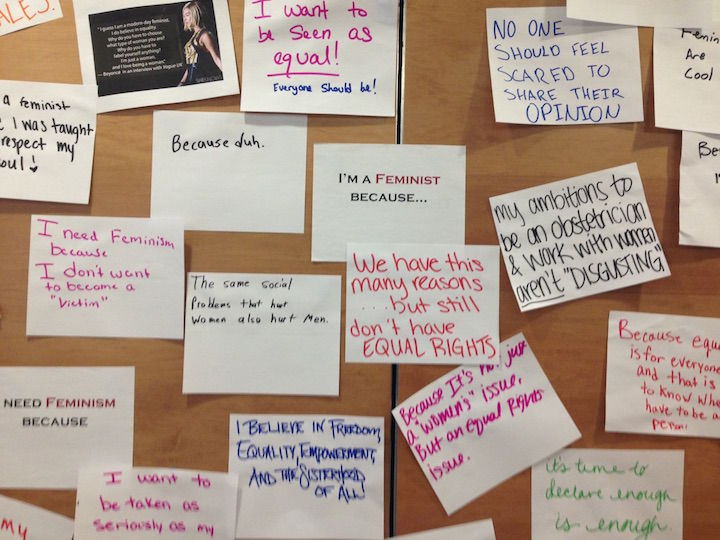Women’s History Month showcases feminism
March 9, 2015
Since March is Women’s History Month, it seems appropriate to address feminism during this time. But what is feminism?
“In one word: equality,” junior Chris Zimmerman said.
“Giving women equal opportunities,” another junior, Zach Kusick, said.
“Feminism is the belief that all people are created equal no matter what gender they are born into,” sophomore Sarah Curtis said. “And that means that women, as well as men, should have the ability to achieve things in life and that shouldn’t matter how you were born.”
Alison Wolf, a professor teaching classes in the Women’s & Gender Studies, said feminism is about more than that.
“Feminism is about understanding that oppression exists in the world, including and emphasizing oppression against women. It’s not natural. There’s no reason it has to be that way and we can change it,” she said.
Too often, people stereotype feminists as radical and men-haters. Feminists don’t have to be radical.
“Some people think there are negative stereotypes around feminism. I find them ridiculous,” Wolf said. “A feminist is someone who believes, not just that things are messed up, but also that you can change it.”
It doesn’t take a feminist to see the differences in the way women are treated. They aren’t paid equally to men, they don’t receive the same funding for sports, and some things are even more basic than that.
“Women cannot walk alone at night. You can’t possibly have a world without sexism when women are constantly told it’s too dangerous to walk by themselves at night because someone might attack them,” Wolf said.
Some critics of feminism argue that it hurts men, creating more competition for them.
“It can only be true that feminism hurts men if you admit that men have unjustified power positions in society that will rightly be taken away,” Wolf said.
There’s no reason for feminism to be portrayed in a negative light. At the most basic level, it asks for equality, meant only to help and not to harm.
“To me, there is nothing negative about understanding that women should not be oppressed and that we can change the world to make that not happen,” Wolf said.
Being treated fairly does not mean being given special treatment. It’s not about always being favorable to women. It means treating them the exact same way a man would be treated.
“I don’t think feminism should overcompensate for everything. I don’t feel like women should be treated differently than men just because we tend not to get the same rights,” junior Anjali Khankari said.
But why bring this up during Women’s History Month? Obviously the focus is on women, but it also points out the progress that women have made so far.
“The biggest confusion is thinking that it’s done, that feminism is a thing of the past. It happened and now everything’s fine so we don’t need feminism anymore. We do need feminism. Things are not done,” Wolf said. “It has made progress but progress is a long way from being done.”







